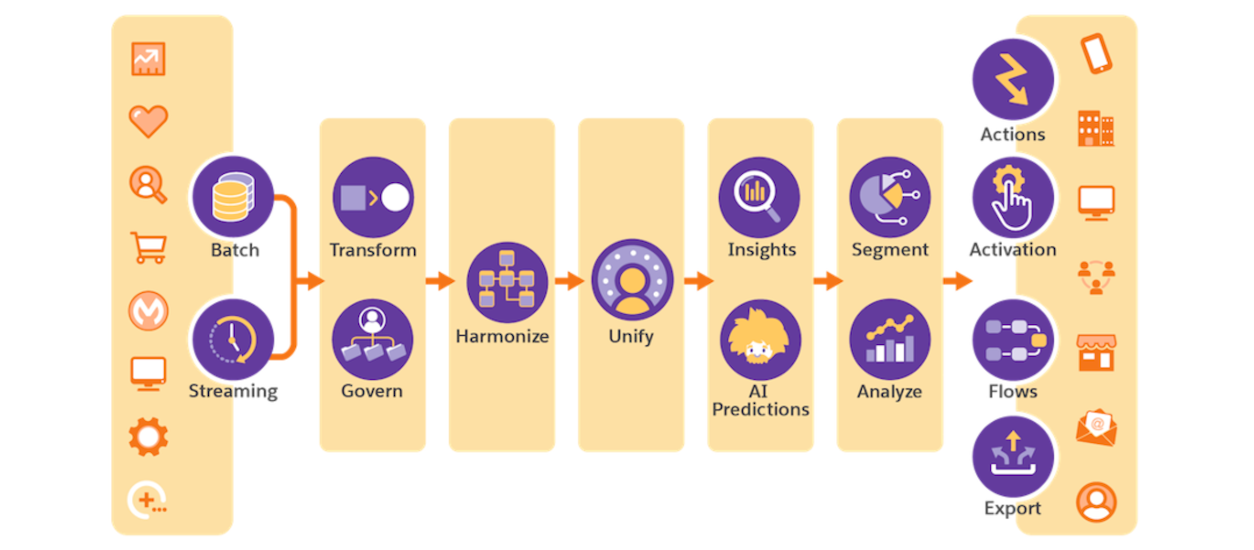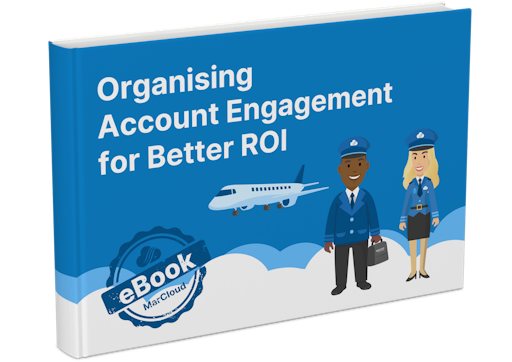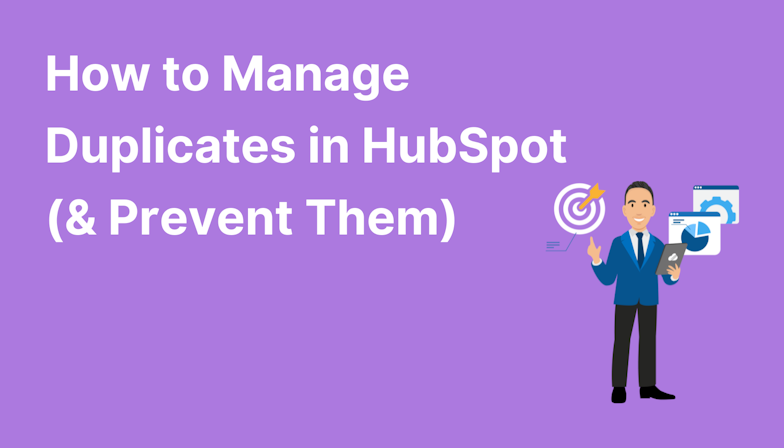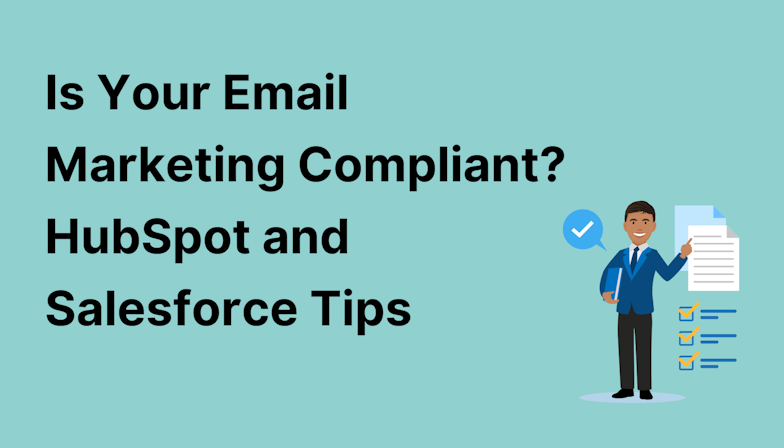Your free Data Cloud account includes:
250,000 Data Services credits
1 TB of data storage
1 Data Cloud admin
100 internal Data Cloud identity users
1,000 Data Cloud PSL
5 integration users
Ultimate+ customers get even more credits with 2,500,000 at their disposal.
But wait, this might all be a bit overwhelming if you don’t feel ready to jump into Data Cloud just yet. Maybe you have some work to do within your Marketing Cloud instances before you can feel confident in your data. For example, cleaning up your Salesforce or third-party data, or structuring your fields correctly.
If that’s the case, keep reading because below you’ll find explanations and links to useful resources that will help you with preparing for Data Cloud.
Sales Cloud data
The first thing you’ll want to do is ensure that your Sales Cloud data is clean, consistent and reliable. This involves ensuring lead sources are attributed correctly, removing any duplicate records, getting Lead Status right, and double-checking all of your tracking is in place.
How to Master Lead Source in Salesforce & Account Engagement - Assigning leads and ensuring they reach the right place is key because it will impact your velocity reports and aid with understanding which conversion points are most effective. With Account Engagement, you will want to know which Business Units are producing leads and where from. Getting this step right will ensure your data is clean and Sales Cloud isn’t full of cold leads.
How to Remove & Prevent Salesforce Duplicate Records - Duplicates are the bane of any report. You simply cannot report on activities with confidence if you are using duplicates. It’s important to identify if you have duplicate records in the system before diving into a tool like Data Cloud.
Marketing on One Platform [WEBINAR] - This webinar is packed with four demos. Check them out for some good visuals and context around how you can use Account Engagement, Sales Cloud, Marketing Cloud and B2B Marketing Analytics:
15:30 - Demo #1 - custom solution for UTM parameters in prospect records
22:36 - Demo #2 - Sales Cloud actions for MCAE with a cold lead example
28:42 - Demo #3 - Ad Studio integration with Pardot and Sales Cloud
36:20 - Demo #4 - Analytics for tracking campaigns with multi-touch attribution
Moving Through the Sales Cycle using Salesforce Lead Status - There is a lot of data to be found within Lead Status. The time a lead takes in each stage, how stages differ between industries and different size companies, how different content can reduce this time and so on. Take a look at our tips for getting this right.
Salesforce Sales Cloud vs. Service Cloud vs. Commerce Cloud - You might be using different Salesforce clouds and if so, you will want to map out how you are using each of these so you can extract the relevant data from each and use it within Data Cloud.
Account Engagement (Pardot)
Request a free Account Engagement audit from MarCloud by contacting us here. We do most of the legwork and you understand the next best steps.
Let’s face it, bad data in means bad data out. You need to be sure your Account Engagement instance is in order before you jump into Data Cloud because otherwise, you won’t be as invested in the tool as you should be.
Here are the key resources we recommend you take a look at to get ready for a good experience with Account Engagement for Data Cloud.
Organising your account & data
Recommended eBooks:
How to Organise Your Pardot Account Like a Pro - This eBook will help you get your account in total order. Use this as a map towards Account Engagement organisation!
Pardot Audit Checklist - Paired with the eBook above, this is a more practical document to help you tick off the steps needed to clean up Account Engagement.
Pardot Marketing Calendar for Account Hygiene - If you have campaigns planned ahead of time, you can use this tool to schedule in the plan of action and assets you’ll need to create for each campaign. Very useful!
Pardot Implementation Checklist - For those who are not confident in the technical setup of their Account Engagement instance, run through this implementation checklist to ensure you have not missed a step somewhere which could negatively impact the data sync. This needs to be set up correctly for any meaningful data to be later used in Data Cloud.
Recommended blogs:
The Ins and Outs of Pardot and Salesforce Integration - Getting integration right is crucial because it’s all about the data flow between Pardot (Account Engagement) and Sales Cloud. This is step one in being confident accurate data will appear in Data Cloud.
How to Manage & Clean Your Pardot Database - Pardot is the ‘filter’ for your data in Sales Cloud so the cleaner the Pardot database is, the cleaner your CRM data will be and subsequently, the prettier your Data Cloud reports and insights will be. Take a look at how you should be keeping on top of your Pardot database.
Understanding Pardot and Salesforce Sync Behaviours - Top tip: Only the fields and prospects that are syncing with Salesforce will appear in Data Cloud. In other words, if you have prospects that exist solely in Pardot these will not show in Data Cloud. It’s unlike B2B Marketing Analytics which can see these prospects. So, if you don’t want data to show in Data Cloud, keep it Pardot-only!
The Beginner’s Guide to Pardot Field Definitions - I am throwing this blog in here in case you are unaware of the definitions of certain fields. This blog covers it all so it could be quite a useful skim read!
10 Tips for Organising Your Pardot Account [INFOGRAPHIC] - For you visual folk out there, we run through the 10 things you need to focus on to tidy up Pardot.
Why You Should Use Pardot Folders for Better Marketing - This isn’t directly impactful to Data Cloud but I personally think setting the right behaviours with good admin can lead to better data and results. So, using a strong folder hierarchy in Pardot and setting campaigns up in a structured way can help you further down the line.
Recommended interactive tools:
Quick Pardot Health Check - Seven quick questions to sense-check some of the core functionality in Pardot. We use dynamic content to send you a tailored answer here, it’s pretty cool.
Pardot Naming Convention Builder - Structure is everything. We built a really simple naming convention builder so you can copy and paste the values into Pardot. You do not need to fill in a form to use this, it’s completely free of strings.
Campaigns & campaign hierarchy
Campaigns unlock return on investment (ROI) figures and provide a clear analysis of the effectiveness of a marketing activity. It is really key to get this right if you want to access valuable insights that lead to revenue.
Recommended blogs:
A Complete Guide to Pardot Campaign Reporting & Multi-Touch Attribution - This is a really comprehensive article detailing how you collect data and bring it across into the Sales Cloud platform for usage with analytics. These principles are really key and will help you in your Data Cloud journey.
Pardot Connected Campaigns - Most clients have Connected Campaigns enabled at this point but if you do not, or you do not have a clear method to the madness then you need to read this article. Campaign alignment between the systems is a must.
Pardot Campaigns Quick Audit: Visualising the System - How do you even audit your campaigns? Good question, here’s how.
Campaign Influence: How MarCloud Uses Pardot - We quite literally tell you how we run our own Pardot instance. This is to help you see the art of the possible and you can take what we do and adapt it into your own approach. Lots to learn here!
Supercharge Campaigns: Connect Pardot & Advertising Studio - If you have Pardot and Ad Studio, you can connect the two. Even better, you can use all of the data as part of this integration and power Data Cloud. This is slightly advanced so definitely reach out to us if you want a hand connecting the dots.
Data compliance
Recommended blogs:
Managing Pardot Cookie Consent & Web Tracking - Are you allowing prospects to opt-in to tracking? If not, you could be losing out on a lot of data. Data that could be used later on in Data Cloud. Make sure you are connecting the dots and associating cookies to prospects correctly.
Pardot and GDPR Compliance Checklist: Can You Score 10? - If you don’t score 10, you are in the same boat as most clients! Identifying the problem is the first part of solving it so check your score today.
How to Set Up Pardot Form Tracking: Google Tag Manager & GA4 - If you use Google Analytics, this blog will help you align Pardot with your GA4 tracking.
Governance & Business Units
Recommended blogs:
Why Campaign Influence Is A Must For B2B Marketing Analytics Plus - This article helps with the foundational setup for preparing your account to feed Data Cloud.
The Pardot Business Units Implementation Guide - You must structure your Pardot Business Units in a coherent way that enables your teams and generates high-quality data. We’ve seen companies where lots of different parts of the business use the same instance of Pardot and this can blur the lines and cause problems with reporting. Read this guide to learn how best to align your organisation with Business Units.
Pardot Business Units: What You Need to Know - Adding to the above, this blog provides more context and some other angles to how you can approach Business Units.
5 Reasons To Use Pardot Advanced & Business Units - If you can’t see the benefits of Pardot Business Units, let us show you.
How to Automate Lead Assignment for Salesforce Platforms - Lead assignment fuels the sales teams but it will also help fuel Data Cloud so mapping this is very important.
How to Use Marketing Data Sharing in Pardot & Salesforce - The Pardot connector is what allows Sales Cloud to see data. Get this right and you won’t have any sync issues or conflicting reports. Get this wrong and it could seriously skew the output of Data Cloud.
How to Successfully Align Pardot Data Capture with Grading - The key takeaway within this article is how you capture data. This is normally the first point of entry for most prospects so you need to think about how your data is actually being created, maintained and cleaned. You could automate a lot of this.
Understanding your data
There are already a bunch of reports in your account to help with reporting and analytics so getting to grips with these will only benefit you when connecting with Data Cloud.
Recommended blogs:
Tableau CRM Analytics Studio: Intro to Prospect & Activity Dataset - Understanding the data that is available to you will help you discover the art of the possible when looking at Data Cloud. As everything is being housed within Salesforce, it means we can use it. Very powerful.
10 Best Practices for a Custom B2BMA Dashboard - This is very B2B Marketing Analytics related however some of the ideas here can help you understand what results you want from Data Cloud. What is your objective? How will you use Data Cloud to power your campaigns?
SaaS Marketing Automation [WEBINAR] - This webinar applies mostly to SaaS businesses where we demonstrate the technical applications of setting up and maintaining lead capture and prospect nurture journeys for better business outcomes.
Twig Case Study: Setting the Business up for Analytics Success - I am adding this here because we worked with a client on cleaning up their org and structuring it in a way that allowed them to harness data from B2B Marketing Analytics. The same concept applies to Data Cloud, whereby we need to do a bit of pre-work to enable the powerful insights later on. If your account needs some pre-work, this is worth a read.
Marketing Cloud
Data Cloud can truly unlock huge potential within Marketing Cloud via powerful segmentation and personalisation. The best place to start with understanding what’s possible is our blog on cross-channel marketing success:
The effective integration of Salesforce Data Cloud and Marketing Cloud makes cross-channel success seamless. This powerful synergy enables companies to interact with customers through a variety of channels and provide personalised experiences that promote growth and loyalty. Elevate your marketing strategies with this game-changing partnership.
Recommended blogs:
Making Sense of Marketing Cloud Connect
To fully utilise Salesforce's marketing capabilities, it is essential to understand Marketing Cloud Connect. By bridging the gap between the sales and marketing clouds, this integration enables frictionless data sharing, automation, and insights.Why is Marketing Cloud Engage the Leading MAP for Data?
Marketing Cloud Engage stands out as the top MAP for data thanks to its strong capabilities in data-driven marketing. It equips businesses to make wise decisions and run successful campaigns with strong segmentation, personalisation, and analytics tools. With the data-centric approach of Marketing Cloud Engage, your marketing strategy will be elevated.A Simple Guide to Salesforce Marketing Cloud Journey Builder
This simple guide to Salesforce Marketing Cloud Journey Builder provides a step-by-step walkthrough for creating and optimizing customer journeys. Unlock the power of personalized, data-driven marketing campaigns with this easy-to-follow resource.
Recommended eBooks:
Salesforce Marketing Cloud: Beginner’s Guide to Data Extensions [eBook]
Discover the fundamentals of Data Extensions in Salesforce Marketing Cloud with this beginner's guide. Learn how Data Extensions help with organising and managing your data, creating custom audiences, and launching targeted campaigns.Salesforce Marketing Cloud Glossary
The Salesforce Marketing Cloud Glossary is your concise reference for understanding key marketing terms and concepts. Streamline your marketing conversations and enhance your knowledge with this valuable resource.
Data Cloud
Data Cloud is an ETL (Extract, Transform, Load) tool that will pull on existing data, manipulate it and spit out actionable insights that marketers can use to power their campaigns.

Source: Salesforce help
The below links will take you to helpful Salesforce resources for Data Cloud:
Use Data Cloud Segments in Account Engagement
Leverage Data Cloud Segments to enhance your Account Engagement strategy. Elevate your targeting and personalisation efforts with this valuable data-driven tool.Data Cloud Features
Discover all of Data Cloud's features to unleash the power of data-driven decision-making and individualised marketing. Make the most of your data use with this complete set of tools.Get Started Using Data Cloud
Begin your journey into the world of Data Cloud with a user-friendly guide. Unlock the power of data-driven insights and strategies to elevate your business.
Explore the world of Data Cloud-powered experiences to learn how to design effective customer interactions that are informed by data. You will be given the knowledge necessary to improve your marketing tactics after reading this one Trailhead guide.
For more guidance on preparing for Data Cloud, reach out to us for an account audit or help with getting started. We provide implementation and ongoing Data Cloud support.

Tom Ryan
Founder & CEO of MarCloud, Tom has been on both sides of the fence, client-side and agency, working with Salesforce platforms for the best part of a decade. He's a Salesforce Marketing Champion and certified consultant who loves to co-host webinars and pen original guides and articles. A regular contributor to online business and marketing publications, he's passionate about marketing automation and, along with the team, is rapidly making MarCloud the go-to place for Marketing Cloud and Salesforce expertise. He unapologetically uses the terms Pardot, Account Engagement and MCAE interchangeably.
More by Tom RyanFeatured resource

Organising Pardot for Better ROI
Tidying your Pardot account is step one in making your life easier, saving time and increasing return on marketing investment! Here you’ll find a complete guide to organising your Pardot account like a pro – whether you’re working with a new implementation or a mature account that’s in a bit of a mess.
Download now

